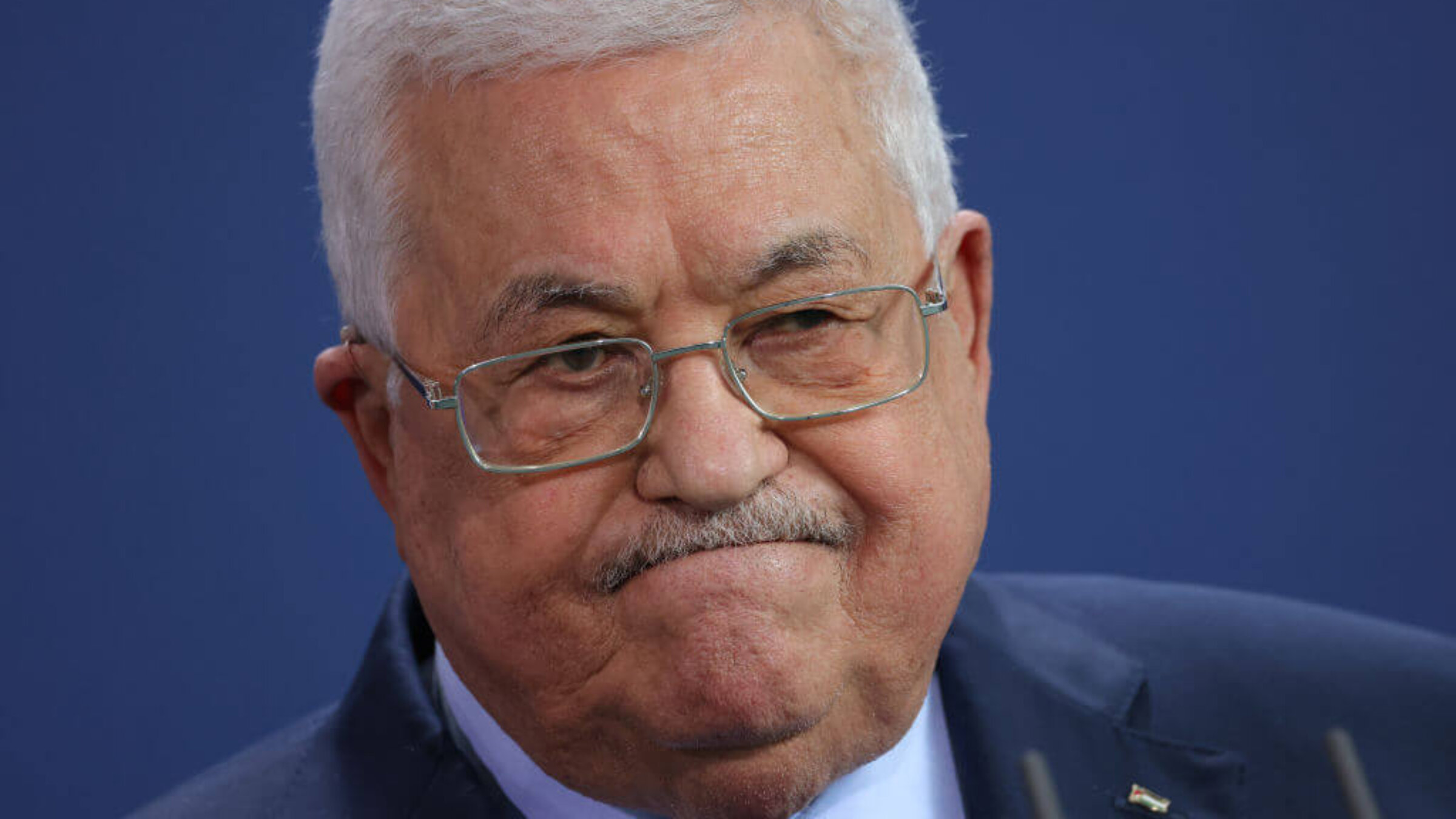Palestinians aren’t fooled by Abbas flip-flopping on the Holocaust
Abbas’ Holocaust remarks were a desperate stunt to revive his collapsed popularity

Mahmoud Abbas, President of the Palestinian National Authority, speaks to the media with German Chancellor Olaf Scholz (not pictured) following talks at the Chancellery on August 16, 2022 in Berlin, Germany. Photo by Sean Gallup/Getty Images
Palestinian Authority President Mahmoud Abbas was recently asked at a press conference in Berlin if he would apologize for the 1972 Munich attack, the massacre of 11 Israeli Olympians by the Palestinian terror group Black September.
Abbas replied that “from 1947 to the present day, Israel has committed 50 massacres in Palestinian villages and cities. 50 massacres, 50 Holocausts, and until today, and every day there are casualties killed by the Israeli military.”
This offensive and faulty comparison ignited an intense wave of backlash against the PA president, which prompted him to issue an apology the following morning, emphasizing that “the Holocaust is the most heinous crime in modern human history.”
His history of making similar controversial statements was quickly pointed out. His own Ph.D thesis in the 1980s was premised on Holocaust revisionism. And in 2018, he said in a long rambling speech that European Jews were persecuted because of their “social behavior, [charging] interest, and financial matters,” rather than because of their identity or religion (the octogenarian president then also apologized the following day).
But to a Palestinian, Abbas’ bombastic “50 Holocausts” statement (and walkback) exemplified another of his worst traits: Abbas has a long track record of trying to serve two masters. Abu Mazen desperately tries to appease Israel, even if it means enraging Palestinians, while also trying to maintain absolute control at home.
Abbas previously apologized for the second intifada and called it “one of our worst mistakes.” He faulted the Arabs for not accepting the 1947 partition plan. He unabashedly called the PA’s security collaboration with the Israeli military against Palestinians “sacred,” publicly gave orders to his troops on national TV that “whoever sees someone carrying a projectile [to attack Israel], shoot them, kill them,” and boasted that “our security forces go into schools and search their bags to see if [kids] have knives [to attack Israeli soldiers with].” He said unashamedly, “I live under the boots of the Israelis,” and that he has no right to live in his birth and boyhood town Safed.
As many as 80% of Palestinians want Abbas to resign, and the PA’s deeply disliked leader is currently desperate to restore his collapsed popularity as he feels his West Bank throne becoming unstable.
Perhaps he resorted to such a cheap populist stunt in the hopes that it would resonate with some Palestinians who do not fully comprehend the connotation of the word Holocaust. Many Palestinians feel bitter that Israel and Western governments are seldom agitated by our oppression (and that an Israeli official would have likely never gotten a similar demand in a European capital to apologize for atrocities committed against Palestinians).
Abu Mazen’s response was deliberately meant to make him seem uncompromising, confrontative and revolutionary. But most Palestinians can see through this malarkey.
Prominent Palestinian writer Yasir Za’atra wrote, “Abbas is in need to revive his dying popularity. The attacks of the leaders on him are an opportunity for his supporters… What is the point of criticizing [Israel] when he’s simultaneously providing them with the cheapest occupation in history?”
Abbas is often in this contradictory spot; he is supposed to lead a Palestinian struggle for freedom and dignity while presiding over what has become a subservient subcontractor entity of Israel’s occupation. He is constantly trying to seek legitimacy and validity from both Palestinians and for Israel, and everyone finds him detestable.
This is why he is sometimes praising the peace process, mourning Yitzak Rabin, taking pride in the security collaboration and condemning armed resistance, while at other times bashing Israel and making inflammatory statements. Both modes aim to distract from the fact that he’s a corrupt autocrat who is unrequitedly policing Israel’s occupation, suppressing his own people and rejecting democratic elections.
The result of Abbas’ doublespeak is that it renders anything he says or does meaningless, especially to his own people, with whom he has long ago lost all credibility.
His recent bombastic offensive statements do not help the Palestinians one bit, but do give Israel another chance to repeat the myth that they have “no partner for peace on the other side.”
Abbas’ statement is also a helpful reminder of the foolishness of the comparison he made. Victimhood and suffering are not a competition. It’s entirely hideous to trivialize a people’s suffering and trauma (especially the unique suffering and trauma of the Holocaust) to emphasize the seriousness of another people’s pain.
Mutual recognition of pain and trauma are a gateway to reconciliation, while turning suffering into a competition of whose wounds are deeper and more painful is a surefire recipe for more hate, conflict and blindness to the other’s pain.
There was never a need for Abbas to insult and awaken the trauma of our Jewish sisters and brothers in a futile bid to score a few political points domestically. Instead, the Palestinian president would garner more substantial and meaningful popularity if he were to genuinely act in his own people’s best interests.
A good start would be announcing presidential elections to let Palestinians choose their own representative leadership.
To contact the author, email [email protected].
















